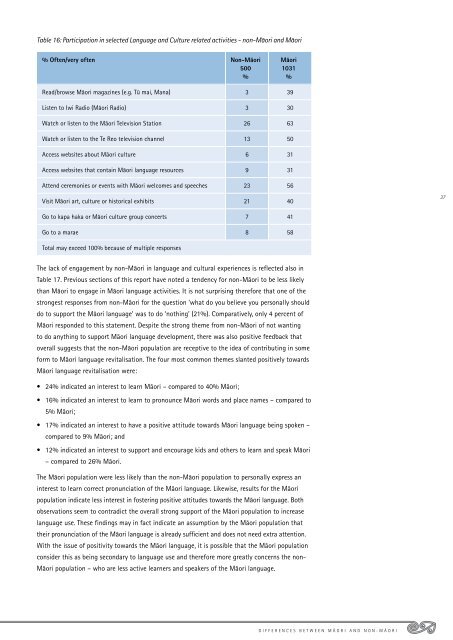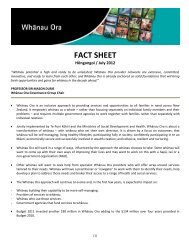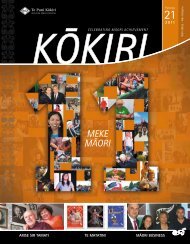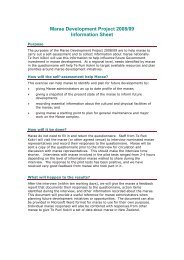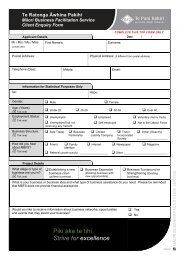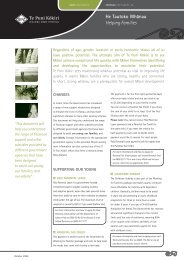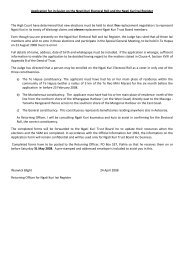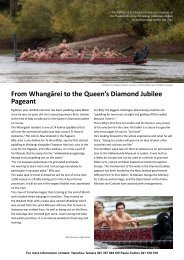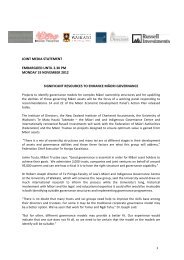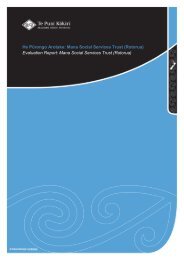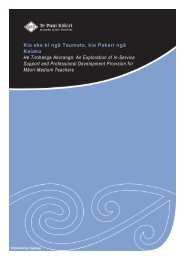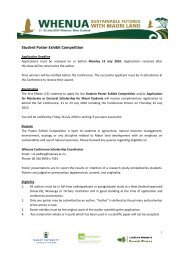2009 Survey of Attitudes, Values and Beliefs ... - Te Puni Kokiri
2009 Survey of Attitudes, Values and Beliefs ... - Te Puni Kokiri
2009 Survey of Attitudes, Values and Beliefs ... - Te Puni Kokiri
Create successful ePaper yourself
Turn your PDF publications into a flip-book with our unique Google optimized e-Paper software.
Table 16: Participation in selected Language <strong>and</strong> Culture related activities - non-Mäori <strong>and</strong> Mäori<br />
% Often/very <strong>of</strong>ten Non-Mäori<br />
500<br />
%<br />
Mäori<br />
1031<br />
%<br />
Read/browse Mäori magazines (e.g. Tü mai, Mana) 3 39<br />
Listen to Iwi Radio (Mäori Radio) 3 30<br />
Watch or listen to the Mäori <strong>Te</strong>levision Station 26 63<br />
Watch or listen to the <strong>Te</strong> Reo television channel 13 50<br />
Access websites about Mäori culture 6 31<br />
Access websites that contain Mäori language resources 9 31<br />
Attend ceremonies or events with Mäori welcomes <strong>and</strong> speeches 23 56<br />
Visit Mäori art, culture or historical exhibits 21 40<br />
37<br />
Go to kapa haka or Mäori culture group concerts 7 41<br />
Go to a marae 8 58<br />
Total may exceed 100% because <strong>of</strong> multiple responses<br />
The lack <strong>of</strong> engagement by non-Mäori in language <strong>and</strong> cultural experiences is reflected also in<br />
Table 17. Previous sections <strong>of</strong> this report have noted a tendency for non-Mäori to be less likely<br />
than Mäori to engage in Mäori language activities. It is not surprising therefore that one <strong>of</strong> the<br />
strongest responses from non-Mäori for the question ‘what do you believe you personally should<br />
do to support the Mäori language’ was to do ‘nothing’ (21%). Comparatively, only 4 percent <strong>of</strong><br />
Mäori responded to this statement. Despite the strong theme from non-Mäori <strong>of</strong> not wanting<br />
to do anything to support Mäori language development, there was also positive feedback that<br />
overall suggests that the non-Mäori population are receptive to the idea <strong>of</strong> contributing in some<br />
form to Mäori language revitalisation. The four most common themes slanted positively towards<br />
Mäori language revitalisation were:<br />
• 24% indicated an interest to learn Mäori – compared to 40% Mäori;<br />
• 16% indicated an interest to learn to pronounce Mäori words <strong>and</strong> place names – compared to<br />
5% Mäori;<br />
• 17% indicated an interest to have a positive attitude towards Mäori language being spoken –<br />
compared to 9% Mäori; <strong>and</strong><br />
• 12% indicated an interest to support <strong>and</strong> encourage kids <strong>and</strong> others to learn <strong>and</strong> speak Mäori<br />
– compared to 26% Mäori.<br />
The Mäori population were less likely than the non-Mäori population to personally express an<br />
interest to learn correct pronunciation <strong>of</strong> the Mäori language. Likewise, results for the Mäori<br />
population indicate less interest in fostering positive attitudes towards the Mäori language. Both<br />
observations seem to contradict the overall strong support <strong>of</strong> the Mäori population to increase<br />
language use. These findings may in fact indicate an assumption by the Mäori population that<br />
their pronunciation <strong>of</strong> the Mäori language is already sufficient <strong>and</strong> does not need extra attention.<br />
With the issue <strong>of</strong> positivity towards the Mäori language, it is possible that the Mäori population<br />
consider this as being secondary to language use <strong>and</strong> therefore more greatly concerns the non-<br />
Mäori population – who are less active learners <strong>and</strong> speakers <strong>of</strong> the Mäori language.<br />
d i f f e r e n c e s b e t w e e n m ä o r i a n d n o n - m ä o r i


